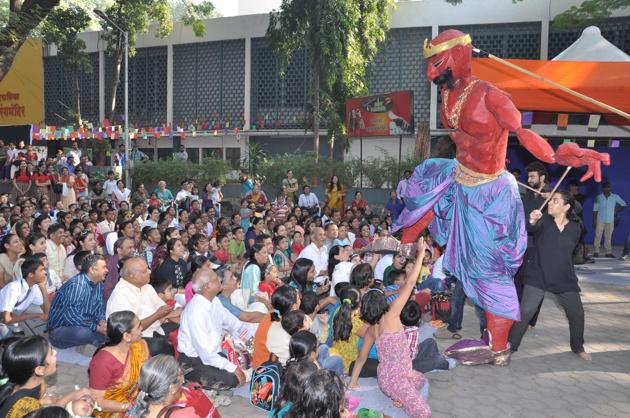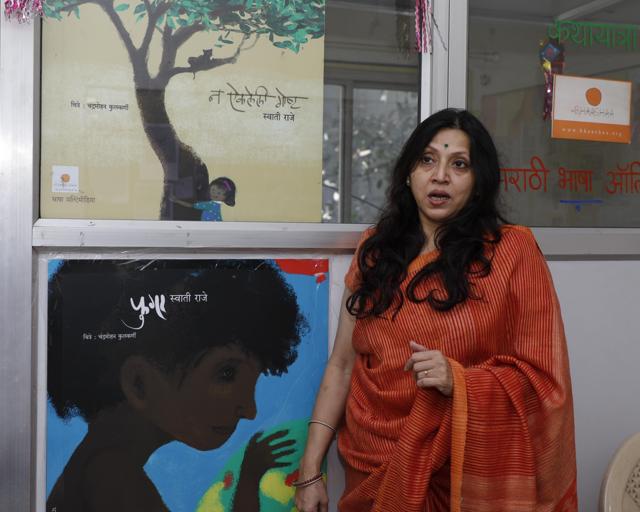Pune-based Bhaashaa Foundation is working towards preserving local languages
Bhaashaa Foundation’ started in 2008 by journalist Swati J Raje who has now become a prominent name in the sector of language studies not only in India but on international level
In today’s world of social media and technology there is one such organisation which is working for the preservation and enhancement of the local regional languages across the globe. ‘Bhaashaa Foundation’ started in 2008 by the renowned journalist Swati J Raje has now become a prominent name in the sector of language studies not only in India but on international level. And in last one decade Swati Raje and her team has worked day and night to come up with an unique sustainable models which can be used anywhere in the world to preserve the local regional languages. Recently on February 27 the ‘Marathi Bhasha Din’ was celebrated worldwide, it is a day which marks the birth anniversary of eminent Marathi writer and poet Vishnu Vaman Shirwadkar also known as Kusumagraj. So on this occasion HT spoke to Swati Raje and tried to find out her long journey being a journalist, about her Bhaashaa Foundation work and their future plans.

Early Life
“I was from a very well educated and joint family where the traditional moral values about our education and traditions were followed. Since age 7 I started writing poems in Marathi and till I reached 10th standard I had a collection of more than 100 poems in my book. Also I had my own library in our house during the school days, where I had a collection of famous novels and other books. This love for language and reading somewhere came to me from my grandmother, I remember she used to recite poems, traditional songs and tell me various stories from the history and mythology,” remembered Swati. “During my schooling days only I had decided to make a career in Arts. So accordingly I completed my Bachelor of Arts in Psychology and then completed Bachelor of Journalism course from the Pune University. Also I used to do acting in plays in my college days.” she added.
Professional life
Just before getting married to Jaydeep Raje, who is an owner of a civil engineering company Swati joined a prominent media group as field reporter. “At that time it was a tough call for me to join media field, when there was no woman reporter going out on field to cover news stories. But I must say only because of support given by husband, in-laws and my parents it was all possible. Specially my mother-in-law renowned Marathi writer Shailaja Raje supported me allot and never questioned me over late working hours or any other household issues,” said Swati. From 1987 to 2001 Swati Raje worked from field reporter to Feature department head in Sakal media group in Pune, Mumbai and Aurangabad editions. During this working period only Swati completed her MA in Marathi literature.
“During my journalism years I came in close contact with prominent writers and eminent people from all fields and then I started realising that we are going into a phase of change when Television and computers were started coming. This was the time when I started liking children literature and somewhere thinking about working in this field. Finally in 2001 I left my job from Sakal to move ahead in my life.” dded Swati.
For the next few years Swati was doing dialogue writing work for some of the Marathi serials. She also started doing research in Marathi literature and then completed her MPhil.

Start of Bhaashaa Foundation
“So during my visits to some of the international conferences on preserving international languages to South Africa and some other countries, I came to know about their beautiful system of preserving the local languages by various. And the important one is of having reading libraries, there was different types of libraries in SA and then I decided to have such a system for our country,” said Swati. “In 2006 I started my work from our parking lot with 6 students where we used to initially take reading of books and some sessions for children. For two years I was working and testing out that whether this model of reading and experiencing language is accepted by people or not. And the outcome was excellent, as children and parents were in need of this where they want to get something to read good with fun.” She said.
Finally in July 2008 officially Bhaashaa Foundation was registered with prominent people from different fields like journalists, writers and corporate sector became the trustees for the Foundation. “My first support to start this foundation was my husband and my children – daughter Saawani and son Atharva. It was my long journey and experience all put behind Bhaashaa Foundation to come up such modules where children can learn their local regional language with fun.”
Bhaashaa Foundation work
There are six verticals under which Bhaashaa Foundation carries out its activities. First one is Pustak Ghar (library of books), under this 6 different low income areas in Pune district where book reading activity is taken. Also ‘Read while you wait’ is another concept started under this initiative. “We want to come out of that traditional ways of reading, where one has to go into the library and then read. We noted out places like government offices, children clinics and gardens where people are waiting or sitting. So we can read books at such places is idea behind this.” said Swati. Foundation has also started Pustak Ghar in 16 rural libraries in Kolhapur district.
Then the second vertical is of ‘School teachers improvement and training the teachers’. If there are good teachers to teach the languages with fun ideas, then certainly students will get more attracted towards languages.
Third vertical is ‘Capacity Building of Students’. “In this vertical we have various modules, a state level inter school reading competition ‘Yaksha Prashna’ which we are taking from last 8 years. Every year a new theme is given and schools from across the state participate in it. Another important initiative which we started is ‘Marathi Olympiad’ from 2015 for 4th to 7th standard students. We are getting an overwhelming response to it. To increase the linguistic inputs and have a parallel and complementary school curriculum this Marathi Olympiad helps students allot. We had to do a massive research and work hard to design all these curriculums for students.” said Swati.

The fourth and today’s world important vertical is of ‘Audio Visual or Performance Based activities’. “Persevering or doing research in regional languages doesn’t mean only reading or writing anything. We have to use modern techniques of audio visuals and also performance based activities to attract children towards our languages. So we have now started ‘Chitrangana Regional Languages film festival’ of two days, where we show regional language films to students.” Swati told HT.
While the fifth vertical is ‘Kathayatra’ a national level story telling event organised by Bhaashaa Foundation which has become a hit in short span. “Today we can see that children are engaged in computers and mobile phones, so their progressive thirst is not fulfilled and from this initiative we are trying to give them option to mobile phones. So we celebrated story telling through this event, there is dance, drama, folk arts and everything related to stories. Both parents and children enjoy in this event and learn many new things through it.” said Swati.
And the last vertical is about ‘Creating quality content for students’, Swati Raje has till now written 5 story books for children in Marathi which are been translated in English and soon in Konkani language. For Marathi Olympiad Activity books are also made by the foundation. Also Foundation takes International conference on linguistic languages every year in Pune and National seminars of Indian regional languages in different parts of the country.
“There is a need of the hour to preserve and enhance the regional languages across the globe and not only in our country. So we have created such sustainable models which can be used anywhere to preserve the local languages. It is important to maintain the social health of the society and finally to tell our children ‘Life is beautiful through language!’” concluded Swati.






